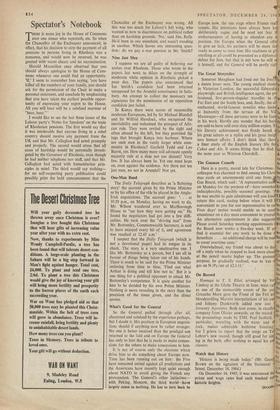Spectator's Notebook
THERE is more joy in the House of Commons over one sinner who repenteth, etc. So when the Chancellor of the Exchequer announced, in effect, that his decision to stop the payment of all pensions to persons living in Rhodesia was a nonsense, and would now be reversed, he was greeted with warm cheers and no recrimination.
Harold Macmillan once observed that you should always apologise to the House of Com- mons whenever one could find an opportunity. 'If,' I seem to remember him saying, 'you have killed all the members of your family, you should ask for the permission of the Chair to make a personal statement, and conclude by emphasising that you have taken the earliest possible oppor- tunity of expressing your regret to the House. All you will hear will be a subdued murmur of "hear, hear."
I would like to see the last three issues of the Labour party's 'Notes for Speakers' on the topic of Rhodesian pensions. The first would say that it was intolerable that anyone living in a rebel country should receive any payment from the UK and that Mr. Callaghan had acted promptly and properly. The second would stress that all cases of hardship would be personally investi- gated by the Governor of Rhodesia, even though he had neither telephone nor staff, and that Mr. Callaghan had acted with humanitarian prin- ciples in mind. The third would say nothing— for no self-respecting party publication could Possibly print the bald announcement that the Chancellor of the Exchequer was wrong. All this was too much for Labour's left wing, who wanted us now to discriminate on political rather than on hardship grounds. `No,' said Jim, flatly. He'd been in one minefield, and wasn't treading in another. Which leaves one interesting ques- tion : do we pay a-war pension to Mr. Smith?






























 Previous page
Previous page